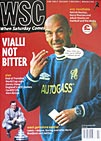 French clubs, heavy expoters of talent, are pleading with their government for help. Neil McCarthy believes it's an opportunity to make some serious reforms
French clubs, heavy expoters of talent, are pleading with their government for help. Neil McCarthy believes it's an opportunity to make some serious reforms
The threat to the transfer system has come as a blow to French clubs just as they had found new confidence. Nicolas Anelka’s £22 million return to Paris Saint-Germain in the summer was the prime symbol of the new euphoria and, more importantly, the new money in French football. Behind the scenes, club presidents had begun to believe they could actually catch up with their English, Italian and Spanish rivals.
However, news that transfer fees could be banned quickly burst the bubble of optimism. France is still a major exporter of players and clubs have come to rely on fees paid by the richer nations for its best players – not only virtually every international, but also over 100 ordinary pros. The loss of this revenue potentially threatens many French clubs and some have suggested that as many as 80 per cent could go out of business, thus threatening the league itself.
Facing this crisis after only a few weeks in office is the French National League’s new president, Gérard Bourgoin. Elected in the summer after a bitter campaign to oust his predecessor, Noël Le Graët, his victory was heralded as a triumph for France’s richest clubs and for what has been termed “foot-business”. Whereas Le Graët ensured the even distribution of TV rights money – and even tried to impose a uniform kit manufacturer on France’s two professional divisions – Bourgoin believes clubs should eventually be allowed to negotiate their own media rights, particularly for cable TV and the internet. Pulling the strings behind the scenes, it appears, are media companies with increasing interests in France’s biggest clubs: Canal+ (PSG), Pathé (Lyon) and M6 (Bordeaux).
As a shareholder in AJ Auxerre, one of the First Division’s poorest clubs, Bourgoin seems an unlikely champion for the cause of football’s moneybags, but he is not without other contradictions: owner of a food-processing empire, he is also a fervent supporter of Cuba and good friends with Fidel Castro. It was perhaps his ability to deal with such conflicts that made him the ideal candidate for the presidency. Although his election marked a definitive swing of power to club presidents, the League itself represents all the actors involved in the professional game:⇣clubs, players, coaches and even referees. The process of decision-making within the League is therefore always a battle between parties with conflicts of interest, not just little clubs against big clubs, but also players against clubs, clubs against referees and so on.
A general assembly of the League on September 15 spent the best part of four hours trying to work out ⌦how to reply to the European Commission’s calls for reforms to the transfer system, but it ended without agreement. The clubs called for a unanimous condemnation of any changes, whereas the players’ union fully supported the abolition of transfer fees, claiming it would end a “modern form of slavery”. In the end, Bourgoin disappointed those who helped him into office, declaring that clubs would have to accept some changes whether they like it or not.
For all their professed belief in a market economy, clubs are now running scared of an idea that would bring them too close to real world economics. Even more ironic are their pleas for government intervention: they demanded a statement from prime minister Lionel Jospin, tax breaks for clubs and players, and an exemption from national insurance contributions.
However, the government’s position is already clear. Sports Minister Marie-Georges Buffet has already stated that she will “defend the specificity of sport within the economy”, but that the way forward is to “correct the recent financial follies by putting sport in the community, by investing in youth training and by the redistribution of wealth down to amateur level”.
Like Bourgoin, but unlike the clubs, she recognises that change has to come. Her belief is that the transfer system should not be banned, but that it needs to be “moralised”. It’s probably a good indication of what will happen when UEFA meet the European Commission at the end of October. It’s likely the transfer system won’t be banned and football (and other sports) will be allowed to act outside rules governing normal businesses. However, there will be a cost: more freedom for players to change clubs, and guarantees that the elite will support those at the grass-roots
That might spell bad news for Canal+, Pathé and M6, but it may turn out to be good news for football.
From WSC 165 November 2000. What was happening this month